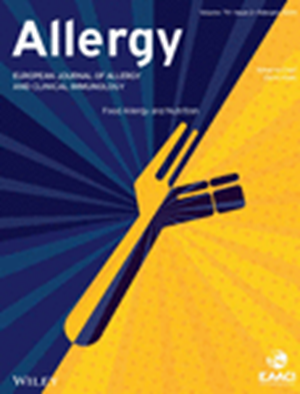Real-Life Clinical Experience With SQ Grass, Tree, Ragweed, and House Dust Mite Sublingual Immunotherapy Tablets: A Review of Evidence From Non-Interventional Studies.
IF 12
1区 医学
Q1 ALLERGY
引用次数: 0
Abstract
This review evaluates data from > 12,000 children, adolescents and adults (≥ 4 years) in non-interventional studies to assess the real-life effectiveness and safety of SQ sublingual immunotherapy (SLIT)-tablets for allergic rhinitis (AR). Non-interventional studies of SQ grass, tree, ragweed, and house dust mite (HDM) SLIT tablets were identified from PubMed (1 January 2006 to 11 February 2025) and supplemented by manual searches. Effectiveness was captured as patient-reported change in AR symptoms; AR and/or asthma medication use, safety and treatment satisfaction were also evaluated. In total, 12,136 participants were enrolled across 22 SQ SLIT tablet studies (grass: n = 6744; HDM: n = 4323; tree: n = 1069; ragweed: n = 102). Across studies, a high proportion of participants reported improvements from baseline or the previous season across nasal (up to 87%), ocular (up to 81%), and bronchial symptoms (up to 78%) with SQ SLIT tablets. Compared to baseline, a lower proportion of patients reported use of symptom-relieving medication, consistent across key drug classes including oral antihistamine, intranasal corticosteroids, short-acting beta-agonist, and inhaled corticosteroids. Discontinuations due to adverse events were low (0%-14.5%). Among studies reporting treatment satisfaction, 73%-96% of participants were found to be 'satisfied' or 'very satisfied' with this treatment. SQ SLIT tablets showed consistent effectiveness for AR, were well-tolerated, and were associated with a high degree of patient satisfaction. These real-life data from clinical practice are a valuable and important source of complementary evidence to the well established efficacy and safety from randomised clinical trials.SQ草、树、豚草和尘螨舌下免疫治疗片的实际临床经验:来自非介入性研究的证据综述。
本综述评估了非介入性研究中来自bb1012,000名儿童、青少年和成人(≥4岁)的数据,以评估SQ舌下免疫治疗(SLIT)片治疗变应性鼻炎(AR)的现实有效性和安全性。从PubMed(2006年1月1日至2025年2月11日)中鉴定出SQ草、树、豚草和屋尘螨(HDM) SLIT片,并辅以人工检索。有效性通过患者报告的AR症状改变来衡量;还评估了AR和/或哮喘药物的使用、安全性和治疗满意度。总共有12136名参与者参与了22项SQ SLIT片剂研究(草:n = 6744; HDM: n = 4323;树:n = 1069;豚草:n = 102)。在所有研究中,高比例的参与者报告使用SQ SLIT片剂后鼻腔(87%)、眼部(81%)和支气管症状(78%)较基线或上一季有所改善。与基线相比,报告使用症状缓解药物的患者比例较低,主要药物类别一致,包括口服抗组胺药、鼻内皮质类固醇、短效β受体激动剂和吸入皮质类固醇。不良事件导致的停药率很低(0%-14.5%)。在报告治疗满意度的研究中,73%-96%的参与者被发现对这种治疗“满意”或“非常满意”。SQ SLIT片对AR表现出一致的有效性,耐受性良好,并与高度的患者满意度相关。这些来自临床实践的真实数据是有价值和重要的补充证据来源,是随机临床试验已经建立的有效性和安全性的补充证据。
本文章由计算机程序翻译,如有差异,请以英文原文为准。
求助全文
约1分钟内获得全文
求助全文
来源期刊

Allergy
医学-过敏
CiteScore
26.10
自引率
9.70%
发文量
393
审稿时长
2 months
期刊介绍:
Allergy is an international and multidisciplinary journal that aims to advance, impact, and communicate all aspects of the discipline of Allergy/Immunology. It publishes original articles, reviews, position papers, guidelines, editorials, news and commentaries, letters to the editors, and correspondences. The journal accepts articles based on their scientific merit and quality.
Allergy seeks to maintain contact between basic and clinical Allergy/Immunology and encourages contributions from contributors and readers from all countries. In addition to its publication, Allergy also provides abstracting and indexing information. Some of the databases that include Allergy abstracts are Abstracts on Hygiene & Communicable Disease, Academic Search Alumni Edition, AgBiotech News & Information, AGRICOLA Database, Biological Abstracts, PubMed Dietary Supplement Subset, and Global Health, among others.
 求助内容:
求助内容: 应助结果提醒方式:
应助结果提醒方式:


